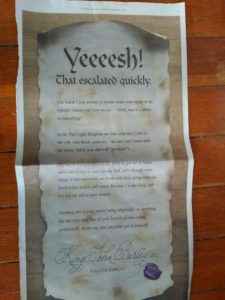A colleague pointed out to me today that I am listed nine times on the Corn Refiners Association website as supporting its petition to the FDA to change the name of High Fructose Corn Syrup (HFCS) to corn sugar.
When the idea first came up, I didn’t think it mattered much. But as I had to add more and more postscripts to my post on the issue, and as I read the comments on it, I was persuaded otherwise. On balance, the arguments against changing the name outweigh the idea that it doesn’t matter (it matters to the Corn Refiners of course).
The FDA is collecting comments on the name change on its website. I filed this comment today:
The FDA should deny the Corn Refiners petition to change the name of High Fructose Corn Syrup (HFCS) to corn sugar.
I understand that the Corn Refiners Association uses my comments on its website to support its position. The website quotes comments I have made to the effect that HFCS is biochemically equivalent to sucrose. It is. But I do not believe that biochemical equivalence is a good reason for the FDA to agree to a name change at this point.
It is highly unlikely that public misunderstanding of nutritional biochemistry and the differential physiological effects of glucose vs. fructose will be addressed and corrected by changing the name of HFCS to corn sugar.
Therefore, the name change is not in the public interest. Its only purpose is to further the commercial interests of members of the Corn Refiners, and that is not one the FDA should be concerned about.
If you have thoughts about the petition, nothing could be easier than telling the FDA what you think:
1. Click on this link.
2. Look on the left side of the page “Results,” “Corn Refiners Association – Citizens Petition,” and on the right side a link that says “Submit a Comment.”
3. Click on “Submit a Comment.” Fill out the form with your name and affiliation. Type in your comment. If a box comes up saying that you are taking too long, click OK and it will give you more time.
My understanding is that there is no particular deadline but rumors are that the FDA will consider all comments submitted by the end of this week.
1. Click on the following link:
http://www.regulations.gov/#!searchResults;dct=O;rpp=10;so=DESC;sb=postedDate;po=0;s=FDA-2010-P-0491
2. You will see on the left side of the page “Results,” “Corn Refiners Association – Citizens Petition,” and on the right side a link that says “Submit a Comment.”
3. Just hit the “Submit a Comment” link, and then you just enter your name and affiliation, etc., type in your comment.
There is no formal comment deadline, but as usual, the sooner a comment is submitted, the more likely FDA will consider it. The best information I have is that FDA will consider all comments submitted by the end of this week.
1. Click on the following link:
http://www.regulations.gov/#!searchResults;dct=O;rpp=10;so=DESC;sb=postedDate;po=0;s=FDA-2010-P-0491
2. You will see on the left side of the page “Results,” “Corn Refiners Association – Citizens Petition,” and on the right side a link that says “Submit a Comment.”
3. Just hit the “Submit a Comment” link, and then you just enter your name and affiliation, etc., type in your comment.
There is no formal comment deadline, but as usual, the sooner a comment is submitted, the more likely FDA will consider it. The best information I have is that FDA will consider all comments submitted by the end of this week.
1. Click on the following link:
http://www.regulations.gov/#!searchResults;dct=O;rpp=10;so=DESC;sb=postedDate;po=0;s=FDA-2010-P-0491
2. You will see on the left side of the page “Results,” “Corn Refiners Association – Citizens Petition,” and on the right side a link that says “Submit a Comment.”
3. Just hit the “Submit a Comment” link, and then you just enter your name and affiliation, etc., type in your comment.
There is no formal comment deadline, but as usual, the sooner a comment is submitted, the more likely FDA will consider it. The best information I have is that FDA will consider all comments submitted by the end of this week.


